英语演讲比赛选手选拔培训计划
小学英语演讲比赛活动方案

小学英语演讲比赛活动方案活动目标本次小学英语演讲比赛活动的目标是提高学生的英语口语表达能力,培养他们的自信心和演讲能力,并促进他们对英语学习的兴趣和参与度。
活动内容1. 报名阶段:- 宣传活动:通过校内海报、校内广播等途径宣传比赛活动,并鼓励学生积极参与。
- 报名方式:学生通过填写报名表格或在指定时间内向老师报名参加比赛。
2. 初赛阶段:- 主题选择:学生可以自由选择演讲主题,鼓励他们选择与自身经历、兴趣相关的主题。
- 演讲准备:学生在指导老师的帮助下,准备一份2-3分钟的英语演讲稿。
- 初赛评选:由学校英语教师组成的评委团对学生的演讲进行评选,选出优秀的演讲者晋级决赛。
3. 决赛阶段:- 演讲技巧培训:为决赛选手组织专门的演讲技巧培训,帮助他们提升演讲的表达能力和语言流利度。
- 决赛筹备:决赛选手根据初赛的反馈意见,对演讲稿进行修改和完善,并进行多次排练。
- 决赛评选:由专业英语教师和外教组成的评委团对决赛选手的演讲进行评选,选出优胜者并颁发奖项。
4. 活动收尾:- 颁奖典礼:在全校师生面前举行颁奖典礼,表彰获奖学生并鼓励他们的努力和成就。
- 经验总结:组织参赛学生和老师进行经验总结和分享,以便今后更好地组织类似活动。
活动安排- 报名时间:XX月XX日至XX月XX日- 初赛时间:XX月XX日- 决赛时间:XX月XX日- 颁奖典礼:XX月XX日志愿者招募为了顺利开展此次活动,我们需要招募一些热心的志愿者协助工作,包括宣传推广、活动组织、评委协助等。
欢迎对英语教育有兴趣的老师、学生和家长积极报名参与,共同为学生的英语学习活动贡献力量。
以上为小学英语演讲比赛活动方案,希望通过此次活动能够激发学生对英语学习的热情,提高他们的英语口语能力,培养他们的自信心和演讲能力。
谢谢!。
大学英语比赛培训方案
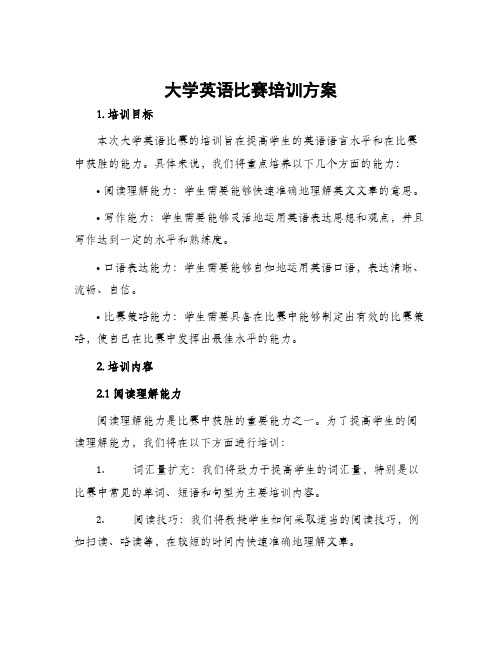
大学英语比赛培训方案1. 培训目标本次大学英语比赛的培训旨在提高学生的英语语言水平和在比赛中获胜的能力。
具体来说,我们将重点培养以下几个方面的能力:•阅读理解能力:学生需要能够快速准确地理解英文文章的意思。
•写作能力:学生需要能够灵活地运用英语表达思想和观点,并且写作达到一定的水平和熟练度。
•口语表达能力:学生需要能够自如地运用英语口语,表达清晰、流畅、自信。
•比赛策略能力:学生需要具备在比赛中能够制定出有效的比赛策略,使自己在比赛中发挥出最佳水平的能力。
2. 培训内容2.1 阅读理解能力阅读理解能力是比赛中获胜的重要能力之一。
为了提高学生的阅读理解能力,我们将在以下方面进行培训:1.词汇量扩充:我们将致力于提高学生的词汇量,特别是以比赛中常见的单词、短语和句型为主要培训内容。
2.阅读技巧:我们将教授学生如何采取适当的阅读技巧,例如扫读、略读等,在较短的时间内快速准确地理解文章。
3.阅读练习:我们将为学生提供大量的阅读材料和阅读练习,让学生通过不断练习提高自己的阅读理解能力。
2.2 写作能力写作能力也是比赛中获胜的重要能力之一。
为了提高学生的写作能力,我们将在以下方面进行培训:1.写作技巧:我们将教授学生一些常见的写作技巧,例如如何开头、如何展开、如何结尾等,使学生的写作更加流畅和连贯。
2.语法讲解:语法是英语写作中一个非常重要的方面。
我们将对一些常用的语法点进行详细解释和讲解,帮助学生更好地运用语法。
3.写作练习:通过大量的写作练习,帮助学生培养英语写作的能力和熟练度。
2.3 口语表达能力口语表达能力是比赛中取得好成绩的关键之一。
为了提高学生的口语表达能力,我们将在以下方面进行培训:1.口语练习:在练习中通过帮助学生克服害怕和紧张,培养其流利、清晰地表达英语的能力。
2.学习句型和口语方法:使学生掌握口语单词和短语,并掌握如何使用和结合英文短语,使其英语口语更加地自然。
3.如何在准备答案之前少数不断的说话和思考,使其表达能力更加的流畅。
英语演讲比赛活动方案

英语演讲比赛活动方案1. 活动背景英语演讲比赛是为了促进学生英语口语能力的提升,培养其表达能力、自信心和演讲技巧而举办的活动。
此次比赛旨在激发学生对英语学习的兴趣,提高他们的英语口语表达能力。
2. 活动目标• 提高学生英语口语表达能力和自信心。
• 培养学生的演讲技巧和表达能力。
• 促进学生之间的交流和互动。
3. 活动内容3.1 比赛类型• 初赛:学校内部选拔赛,每班选派代表参加。
• 决赛:初赛脱颖而出的选手参加的校内决赛。
3.2 比赛形式• 单人演讲:每位选手准备一篇英语演讲稿,主题自选,时间不超过5分钟。
• 分组评分:由评委对选手的表现进行评分,评分分为内容、表达和表现三个方面。
3.3 比赛流程• 报名阶段:学生报名参加比赛,提交演讲稿。
• 初赛阶段:根据演讲稿进行初赛选拔,确定决赛选手。
• 决赛阶段:决赛选手进行现场演讲,评选出优胜者。
4. 资源需求• 比赛场地:学校礼堂或多功能厅。
• 演讲设备:麦克风、音响设备等。
• 奖品及证书:优胜者奖品和获奖证书。
5. 宣传推广• 海报宣传:校园内张贴比赛海报,宣传比赛信息和报名方式。
• 校园广播:通过学校广播宣传比赛相关信息。
• 社交媒体:在学校官方社交媒体平台上发布比赛通知。
6. 安全与风险控制• 确保比赛场地和设备安全,避免意外发生。
• 比赛过程中保持秩序,避免混乱局面发生。
7. 时间安排• 报名时间:XX月XX日至XX月XX日。
• 初赛时间:XX月XX日。
• 决赛时间:XX月XX日。
8. 组织团队• 活动策划组:负责活动方案的制定和宣传推广。
• 评委团:由英语老师和资深演讲者组成,负责评选比赛结果。
• 后勤保障组:负责比赛现场布置和设备维护。
9. 活动评估• 通过参赛选手的表现和参与度评估活动效果。
• 收集学生和老师的反馈意见,为下一届活动改进参考。
特殊应用场合及条款1. 学校跨校区比赛1.场地协调:确保比赛场地符合跨校区比赛的需求,包括容纳人数和设备支持。
英语演讲比赛培训计划

英语演讲比赛培训计划English: In order to prepare students for an English speech competition, a comprehensive training plan should be implemented. This plan should include regular practice sessions focusing on various aspects such as speech content, delivery, body language, and overall presentation skills. Students should be encouraged to select topics that they are passionate about and are relevant to the audience. They should also be given guidance on how to structure their speeches effectively, engage with the audience, and make their presentations memorable. In addition to individual practice, group feedback sessions should be organized to provide constructive criticism and help students improve their speech performance. It is also important to incorporate activities that build confidence and reduce stage fright, such as impromptu speaking exercises and mock competitions. Finally, dedicated coaching and mentorship from experienced speakers can offer valuable insights and guidance to students throughout their training process, helping them refine their skills and prepare for the competition with confidence.中文翻译: 为了为学生准备英语演讲比赛,应该实施一项全面的培训计划。
英语演讲比赛培训计划

英语演讲比赛培训计划Public speaking is an art that combines the personal touch of a storyteller with the precision of a teacher. It is a critical skill for leaders and individuals who wish to influence their audience, advocate for a cause, or simply tell their story. The journey to becoming a compelling speaker is one of continuous learning and practice. This document outlines a training plan designed to prepare individuals for an English speech competition, focusing on developing the skills necessary to deliver a powerful and persuasive speech.Understanding the Basics。
Before diving into the nuances of public speaking, it is essential to grasp the basics. This includes understanding the structure of a speech, which typically consists of an introduction, body, and conclusion. Each part plays a pivotal role in the overall delivery. The introduction sets the stage, capturing the audience's attention and presenting the topic. The body is where the main points are elaborated, supported by evidence and anecdotes. The conclusion ties everything together, reinforcing the central message and leaving a lasting impression.Voice and Diction。
英语演讲比赛辅导计划
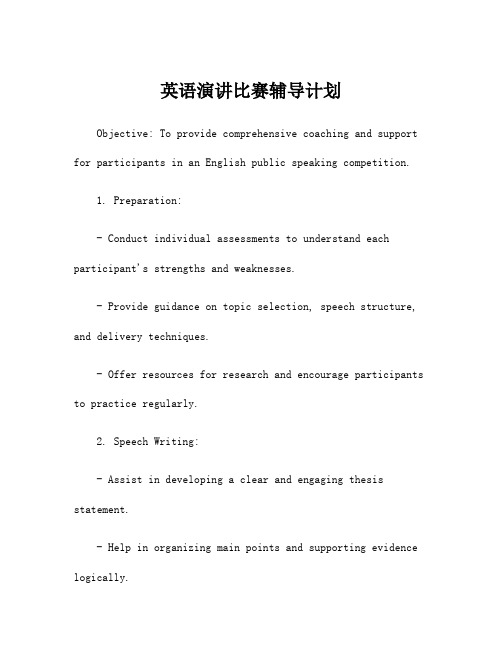
英语演讲比赛辅导计划Objective: To provide comprehensive coaching and support for participants in an English public speaking competition.1. Preparation:- Conduct individual assessments to understand each participant's strengths and weaknesses.- Provide guidance on topic selection, speech structure, and delivery techniques.- Offer resources for research and encourage participants to practice regularly.2. Speech Writing:- Assist in developing a clear and engaging thesis statement.- Help in organizing main points and supporting evidence logically.- Review drafts and provide feedback on content, coherence, and style.3. Delivery Skills:- Focus on voice projection, intonation, and pacing.- Practice body language, eye contact, and gestures for effective communication.- Conduct mock presentations and offer constructive criticism for improvement.4. Overcoming Nervousness:- Teach relaxation techniques and breathing exercises to manage anxiety.- Encourage positive self-talk and visualization to build confidence.- Provide strategies for handling unexpected situations and maintaining composure.5. Rehearsal:- Schedule practice sessions to refine speeches and receive peer feedback.- Emphasize the importance of timing and fluency in delivery.- Conduct dress rehearsals to simulate the competition environment and boost participants' confidence.6. Handling QA:- Train participants to anticipate potential questions and prepare thoughtful responses.- Encourage active listening and clarity in answering queries.- Offer tips on elaborating on key points and engaging with the audience during the question-and-answer session.7. Support and Encouragement:- Provide ongoing encouragement and motivation throughout the coaching process.- Foster a supportive environment for participants to share experiences and seek advice.- Celebrate achievements and progress, no matter how small, to boost morale.By following this coaching plan, participants will be well-equipped to deliver compelling and confident speeches in the English public speaking competition.。
英语比赛培训计划

英语比赛培训计划Introduction:Competitions are an excellent way for students to showcase their skills and talents while also learning important life skills such as teamwork, time management, and perseverance. To help our students prepare for upcoming academic, athletic, and artistic competitions, we have designed a comprehensive training program that will provide them with the necessary tools and resources to succeed.Objectives:The primary objective of this training program is to prepare students for competitions by improving their skills, confidence, and knowledge in their respective fields. The program will focus on developing key competencies such as critical thinking, problem-solving, creativity, and teamwork.Training Content:The training program will consist of the following components:1. Subject-specific Training:This component will focus on enhancing students' knowledge and skills in their respective fields of competition. Whether it is mathematics, science, debate, athletics, art, or music, students will receive specialized training from experienced coaches and instructors.2. Skill Development Workshops:In addition to subject-specific training, students will also participate in skill development workshops designed to improve their critical thinking, problem-solving, and communication skills. These workshops will be interactive and will include activities, case studies, and group discussions.3. Mock Competitions:To simulate the competition environment, students will participate in mock competitions that closely resemble the real thing. This will allow them to practice under pressure and receive constructive feedback from their coaches and peers.4. Time Management and Stress Management:Competitions can be stressful, and it is important for students to learn how to manage their time effectively and cope with stress. Therefore, training sessions on time management and stress management will be part of the program.5. Team Building Activities:For team-based competitions, students will engage in team building activities to improve their teamwork, communication, and leadership skills. These activities will help students understand the importance of cooperation and collaboration.6. Mental and Physical Conditioning:For athletic competitions, students will receive training in mental and physical conditioning to enhance their performance and endurance. This may include exercises, drills, and sports psychology techniques.Training Methodology:The training program will employ a variety of methodologies to cater to different learning styles and preferences. These may include:- Lectures and presentations- Hands-on activities and experiments- Group discussions and brainstorming sessions- Role-playing and simulations- Demonstrations and practical exercises- Peer coaching and feedback sessions- Interactive multimedia resourcesDuration and Schedule:The training program will be conducted over a period of several months, with a flexible schedule to accommodate students' academic commitments and other activities. Sessions will be held during after-school hours and on weekends to ensure maximum participation.Evaluation and Feedback:To monitor students' progress and ensure that the training program is effective, regular evaluations will be conducted. Coaches and instructors will provide feedback to students, and opportunities for self-reflection and improvement will be incorporated into the program.Conclusion:By participating in this comprehensive training program, students will be better prepared to excel in their respective competitions. They will gain valuable skills and knowledge that will not only serve them well in the competition but also in their future endeavors. We believe that with the right training and support, our students will be able to achieve great success in their chosen fields of competition.。
大学生英语竞赛培训计划

大学生英语竞赛培训计划IntroductionThe goal of the College Student English Competition Training Plan is to provide comprehensive training for college students who are interested in participating in English competitions. The plan includes various aspects of English language learning, such as listening, speaking, reading, writing, and test-taking strategies. The training plan is designed to help students improve their English language skills, build confidence, and achieve success in English competitions.Training ObjectivesThe main objectives of the training plan are:- To improve students' listening and speaking skills in English.- To enhance students' reading and writing abilities in English.- To build students' confidence in using English in a competitive setting.- To provide students with effective test-taking strategies for English competitions. Training ContentThe training plan includes the following content:1. Listening and Speaking Skills- Weekly listening practice sessions to improve comprehension skills.- Oral communication exercises to develop speaking fluency and accuracy.- Debate and discussion activities to enhance students' argumentative skills in English.2. Reading and Writing Abilities- Reading comprehension exercises to improve students' reading skills.- Writing workshops to develop students' composition and essay writing skills.- Vocabulary and grammar exercises to enhance students' language proficiency.3. Test-Taking Strategies- Practice tests and mock competitions to familiarize students with the format and style of English competitions.- Strategies for time management and test preparation to help students perform well in competitive settings.Training MethodsThe training plan utilizes a variety of teaching methods, including:- Interactive lectures and presentations to deliver course content.- Group activities and discussions to encourage active participation and collaboration.- Individual and group projects to enhance students' critical thinking and problem-solving skills.- Role-playing and simulations to provide real-life communication practice.Training ScheduleThe training plan is divided into three phases, each consisting of 10 weeks.Phase 1: Listening and Speaking Skills (Weeks 1-10)- Weekly listening practice sessions- Oral communication exercises- Debate and discussion activities- Mid-term assessmentPhase 2: Reading and Writing Abilities (Weeks 11-20)- Reading comprehension exercises- Writing workshops- Vocabulary and grammar exercises- Mid-term assessmentPhase 3: Test-Taking Strategies (Weeks 21-30)- Practice tests and mock competitions- Strategies for time management and test preparation- Final assessmentIn addition to the structured training schedule, students are encouraged to engage in self-study and practice outside of the classroom.Assessment and EvaluationStudents will be assessed and evaluated at regular intervals throughout the training plan. Assessments will include:- Written tests to evaluate students' language skills and knowledge.- Oral presentations and discussions to assess students' speaking skills.- Participation and attendance to monitor students' engagement and progress.At the end of each phase, students will receive feedback and recommendations for improvement. The final assessment will determine students' readiness and preparedness for English competitions.ConclusionThe College Student English Competition Training Plan is designed to provide students with the knowledge and skills they need to excel in English competitions. By focusing on listening, speaking, reading, writing, and test-taking strategies, the training plan aims to equip students with a well-rounded English language proficiency. With dedication and hard work, students can build confidence and achieve success in English competitions.。
中职英语演讲比赛辅导计划

中职英语演讲比赛辅导计划Mid-Level Vocational English Speech Contest Coaching Plan.Introduction.The mid-level vocational English speech contest is a platform for students to showcase their English proficiency and public speaking skills. To prepare students for success in this competition, a comprehensive coaching plan is necessary. This plan outlines the key aspects of coaching, including topic selection, speech development, practice sessions, and performance evaluation.Topic Selection.The first step in speech coaching is selecting an appropriate topic. The topic should be relevant to the competition theme, align with the student's interests and expertise, and provide ample opportunities for the studentto demonstrate their language proficiency. Students should consider topics that allow them to showcase their knowledge, critical thinking, and passion.Speech Development.Once the topic is selected, students can begin developing their speech. This involves outlining the main points, crafting an engaging introduction and conclusion, and practicing effective transitions. Coaches should guide students in developing a logical and coherent speech structure, ensuring that ideas flow smoothly and build upon each other.Practice Sessions.Regular practice is crucial for improving speech delivery. Students should rehearse their speeches multiple times until they are comfortable with the content and can deliver it confidently. Coaches should provide feedback on pacing, intonation, pronunciation, and body language, helping students refine their performance. Simulatedcontest environments can enhance the realism of practice sessions.Performance Evaluation.Evaluating student speeches is essential for identifying areas of improvement. Coaches should use a structured rubric to assess students' performance based on criteria such as content, delivery, language use, and engagement. Feedback should be specific, constructive, and actionable, allowing students to identify strengths and weaknesses and make necessary adjustments.Core Competencies.Content Proficiency:Mastery of the selected topic.Thorough research and analysis.Clear and well-organized presentation of ideas.Language Proficiency:Accurate and fluent use of English.Appropriate vocabulary and grammar.Effective pronunciation and intonation.Public Speaking Skills:Confident and engaging delivery.Effective use of body language and gestures. Strong projection and pacing.Ability to connect with the audience.Time Management:Speech adheres to the specified time limit.Transitions and pacing contribute to a smooth flow.Stage Presence:Maintains eye contact with the audience.Uses the stage effectively.Demonstrates poise and professionalism.Additional Considerations.Student Motivation:Foster a positive and supportive learning environment. Set realistic goals and provide encouragement.Celebrate student successes.Cultural Sensitivity:Respect for the diverse backgrounds of participants.Avoid stereotypes and offensive language.Encourage students to consider multiple perspectives.Technology Integration:Explore the use of technology tools for speech preparation, such as presentation software and online resources.Encourage students to research and cite sources responsibly.Collaboration:Collaborate with other coaches, teachers, and administrators to provide comprehensive support.Seek feedback from guest speakers and experts.Conclusion.A comprehensive coaching plan is essential for preparing students for success in the mid-level vocational English speech contest. By focusing on topic selection, speech development, practice sessions, performance evaluation, and core competencies, coaches can help students enhance their language proficiency, public speaking skills, and confidence. With the right guidance and support, students can strive for excellence and shine on the competition stage.。
英语竞赛培训计划

英语竞赛培训计划IntroductionCompetitions are an important part of a student's academic journey. They provide an opportunity for students to challenge themselves, showcase their skills, and gain recognition for their hard work. Competitions also help students to develop important skills such as critical thinking, problem-solving, and teamwork. In order to excel in competitions, students need to be well-prepared and have a strong understanding of the competition format, rules, and requirements. This training plan is designed to help students prepare for competitions by providing them with the knowledge, skills, and support they need to succeed.GoalsThe goal of this competition training plan is to help students develop the knowledge, skills, and confidence they need to excel in competitions. By the end of the training, students should be able to:● Understand the competition format, rules, and requirements● Develop effective study and preparation strategies● Apply critical thinking and problem-solving skills to competition tasks● Work effectively in teams and communicate clearly and confidently● Manage their time effectively and stay focused and motivated during the competition● Handle competition pressure and stress in a positive and constructive wayTraining ComponentsThe competition training plan will include the following components:1. Competition Overview● Introduction to different types of competitions (e.g. academic, sports, creative, etc.)● Understanding the competition format, rules, and requirements● Researching past competitions and winners to identify patterns and trends2. Study and Preparation Strategies● Time management and goal setting● Effective study techniques and resources● Creating a study schedule and sticking to it● Using practice tests and mock competitions to prepare3. Critical Thinking and Problem-Solving● Engaging in critical thinking exercises and activities● Practicing problem-solving techniques and strategies● Analyzing past competition tasks to identify common themes and challenges4. Teamwork and Communication● Working effectively in teams● Communicating clearly and confidently● Resolving conflicts and challenges within a team5. Time Management and Motivation● Setting priorities and managing time effectively● Staying focused and motivated during the competition preparation● Handling stress and pressure in a positive and constructive wayTraining Methods and ActivitiesThe training plan will include a combination of methods and activities to help students develop the necessary skills and knowledge for competitions. These may include:● Workshops and seminars on competition preparation and strategies● Guest speakers and experts in specific competition areas● Practice tests and mock competitions● Group discussions and activities to promote teamwork and communication● Team building exercises and challenges● Peer mentoring and support● Individualized coaching and feedbackTraining ScheduleThe competition training plan will be implemented over a period of 6 months, with regular sessions and activities scheduled to help students prepare for their specific competitions. The schedule may include:● Weekly workshops and seminars on competition preparation and strategies● Monthly practice tests and mock competitions● Bi-weekly team building and communication activities● Regular coaching and support sessions for individual students● Peer mentoring and study groupsEvaluation and FeedbackThroughout the training plan, students will be evaluated on their progress and performance using a variety of methods such as:● Practice tests and mock competitions● Peer and instructor feedback● Self-assessments and reflections● Team evaluations and assessmentsFeedback will be used to identify areas for improvement and to provide students with the support and resources they need to succeed in competitions.ConclusionCompetitions are a valuable opportunity for students to challenge themselves, showcase their skills, and gain recognition for their hard work. With the right training and support, students can develop the knowledge, skills, and confidence they need to excel in competitions. This competition training plan is designed to help students prepare effectively and succeed in their respective competitions. By providing students with the necessary tools and support, we aim to help them achieve their goals and reach their full potential.。
英语口语大赛培训计划

英语口语大赛培训计划1. IntroductionThe Spoken English Competition is an annual event that aims to promote effective communication and improve English speaking skills among students. As the competition approaches, it is important to provide training and support for the participants to ensure they are prepared to confidently and fluently express themselves in English.This training plan outlines the various components and activities that will be implemented to help the participants develop their speaking skills, overcome their nervousness, and deliver a compelling performance in the competition.2. ObjectivesThe primary objectives of the Spoken English Competition training plan are:- To help participants improve their English speaking skills- To build confidence in speaking English- To enhance participants' ability to articulate their thoughts and ideas effectively- To provide training in public speaking and presentation skills- To familiarize participants with the competition format and requirements- To create a supportive and encouraging environment for participants to practice and receive feedback3. Target ParticipantsThe training program will be open to students of all levels who are interested in improving their English speaking skills and participating in the Spoken English Competition. Participants will be divided into groups based on their proficiency levels, allowing for targeted training and support.4. Training ComponentsThe training program will consist of the following components:4.1. Language Proficiency AssessmentBefore the training program begins, participants will undergo a language proficiency assessment to determine their current level of English speaking skills. This will help in grouping participants based on their proficiency levels and tailoring the training to meet their specific needs.4.2. Spoken English ClassesParticipants will attend regular spoken English classes focused on improving pronunciation, vocabulary, and grammar. The classes will also include interactive speaking activities, discussions, and debates to enhance participants' speaking abilities.4.3. Public Speaking WorkshopsParticipants will receive training in public speaking and presentation skills. This will include techniques for effective delivery, body language, vocal modulation, and engaging the audience.4.4. Mock CompetitionsRegular mock competitions will be organized to help participants practice speaking in front of an audience and receive constructive feedback. This will also familiarize participants with the competition format and requirements.4.5. Individual CoachingParticipants will have the opportunity to receive individual coaching and feedback from experienced English teachers and public speaking experts. This personalized support will help participants identify their strengths and areas for improvement.4.6. Peer Practice SessionsParticipants will engage in peer practice sessions to practice speaking in a supportive and collaborative environment. This will help build confidence and provide opportunities for peer feedback and learning from each other.4.7. Performance PreparationAs the competition date approaches, participants will receive training in performance preparation, including techniques for managing nervousness, developing a compelling introduction and conclusion, and organizing their ideas coherently.4.8. Feedback and ReflectionThroughout the training program, participants will be encouraged to actively seek feedback and reflect on their progress. This will help them identify areas for improvement and continuously work towards enhancing their speaking skills.5. Training ScheduleThe training program will be conducted over a period of 3 months leading up to the Spoken English Competition. The schedule will include weekly classes, workshops, mock competitions, and individual coaching sessions, with additional practice opportunities provided for participants to develop their skills.6. Assessment and EvaluationParticipants' progress will be assessed through regular performance evaluations, feedback from coaches and peers, and self-assessment. This will help track participants' development and identify areas for further improvement.7. ConclusionThe Spoken English Competition training plan aims to provide comprehensive support and training for participants to develop their English speaking skills, overcome nervousness, and deliver a compelling performance in the competition. By implementing the various components and activities outlined in this plan, participants will have the opportunity to build confidence, improve their speaking abilities, and ultimately excel in the competition.。
初中英语学习学科竞赛选拔培训总结计划

培训内容需更新: 随着英语教育的 不断发展,培训 内容也应随之更 新,以适应时代 的变化。
培训时间需合理 安排:培训时间 过长或过短都会 影响学生的学习 效果,应合理安 排培训时间。
培训师资需加强: 培训师资的水平 直接影响到学生 的学习效果,应 加强培训师资的 选拔和培养。
学科竞赛发展趋势和展望
英语学科竞赛将更加注重实际应用能力 未来将有更多形式多样的英语学科竞赛 竞赛内容将更加贴近现实生活和时代发展 选拔培训机制将进一步完善和优化
学生个人发展建议和规划
制定学习计划, 合理安排时间, 提高学习效率。
注重英语听说读 写全面发展,提 高语言应用能力。
积极参加英语竞 赛和活动,锻炼 自己的英语能力。
培养自主学习和 创新能力,为未 来的学习和工作 打下基础。
下一步培训计划和安排
培训内容:听力、口语、阅 读、写作、词汇和语法
培训方式:线上课程、线下 实践、小组讨论和模拟考试
培训目标:提高参赛选手的 英语综合运用能力
培训时间:每周六上午9点 至12点,共12周
THANK YOU
汇报人:
汇报时间:20XX/01/01
综合素质:考察学生的语言表达能力、思维逻辑能力、团队协作 能力等,以确保选拔出具备综合素质的人才。
选拔程序和公平性保障
选拔程序:按照一定的标准 和流程进行选拔,包括报名、 初选、复选和决赛等环节
公平性保障:确保选拔程序 的公正、公平和透明,避免
任何形式的舞弊和偏见
PART 6
培训效果评估
学生英语水平提升情况评估
培养学生英语学 习的兴趣和动力
提高学生英语听、 说、读、写等方 面的能力
增强学生英语实 际应用和交流的 能力
论英语演讲参赛选手应具备的素质及培训策略

论英语演讲参赛选手应具备的素质及培训策略摘要参加英语演讲比赛对于提高大学生的演讲能力和英语综合应用能力至关重要。
本文以河北省高校“世纪之星”英语演讲比赛暨“外研社杯”全国大学生英语演讲比赛为例,分析在英语演讲比赛中获胜选手的必备素质,并提出了相应的培训策略。
关键词英语演讲;必备素质;培训策略近年来,随着中外交往日益频繁,英语的交际性、实用性愈发凸显,新世纪社会与经济的发展需要具备高水平外语能力,特别是英语口语技能的人才。
大学生英语综合应用能力的培养和提高越来越受到有识之士的重视。
河北省高校“世纪之星”英语演讲比赛暨“外研社杯”全国大学生英语演讲比赛,作为我省影响范围和参与面最广的赛事,为大学生提供了展现英语水平和自我风采的平台,增强了学生们学习英语的兴趣和信心,激发了他们提高英语口语的热情。
作为专门培养未来中学英语教师的英语教育专业,邢台学院外语系(以下简称我系)非常重视学生英语演讲能力的培养,并为此作出了很多努力,也取得了一些成绩。
笔者指导的学生在第十二届、第十三届河北省高校“世纪之星”英语演讲比赛中分别获得一等奖和二等奖。
作为指导教师,笔者荣获指导教师一等奖和二等奖。
一直以来,我系积极鼓励学生参加各种类型的英语演讲大赛,并以参赛为契机进一步推动我系英语教育专业教学水平的提高,同时也为提高学生的英语综合应用能力提供了平台。
通过对英语演讲参赛选手的选拔和培训,我们发现凡是在演讲比赛中获胜的选手,都应具备以下的素质:一、英语演讲参赛选手应具备的素质1.博的知识和深厚的思想底蕴英语演讲能力是英语语言综合应用能力和交际能力的具体反映。
成功的演讲者不仅需要语言基础知识和标准的语音语调,还需要设备社会、历史、哲学等学科的知识,在日常生活中还要形成阅读英文报刊杂志的习惯,在获取知识的同时,学习在具体情境中广泛而灵活地运用学到的知识,逐渐形成独立的思维能力和判断能力,这样才能提高自己的认知能力和解决实际问题的创新能力。
演讲大赛培训计划[优秀范文5篇]
![演讲大赛培训计划[优秀范文5篇]](https://img.taocdn.com/s3/m/7786780e657d27284b73f242336c1eb91a373362.png)
演讲大赛培训计划[优秀范文5篇]第一篇:演讲大赛培训计划第六届演讲大赛培训计划周二:选手试麦,看是否有喷麦的现象,并督促校正。
周三:继续试麦,请07级的评委进行培训,纠正选手细节上的不足。
周四:请到(忘了)老师,让选手进行一次比较正式的演讲,请老师做指导。
周五:第一次彩排,完全按照比赛时的程序进行走台、演讲要求穿服装。
周六:第二次彩排,与主持人配合,窜词。
周日:到现场最后一次彩排,练习实地的走台,退场,还有领奖时的细节,与主持人在此配合。
第二篇:英文演讲大赛活动计划。
“澳大利业文化周”英语演讲比赛工作计划本次活动由商务英语系学习部举办的“澳大利亚文化周”英语演讲比赛一、活动目的:使我院大学生初步了解澳大利亚的多元文化及其社会风貌,着力开拓学生的国际视野,引导学生关注热点,培养学生的思辨能力与文化沟通能力。
二、活动方式及要求:面向全校大学生征集英文演讲参赛者,参赛者首先提交演讲稿。
1)、演讲稿主题围绕澳洲社会、文化、旅游或风土人情中的某一方面展开,内容充实、行文流畅、观点明确、富有新意。
2)、演讲稿内容在三分钟以内。
可自撰或自选文章。
3)、参赛者交打印稿或Word格式的电子文稿,并文稿后面附上姓名、联系方式。
三、活动流程:1.主持人介绍评委,嘉宾和选手。
宣读本次比赛的规则及评分标准。
2.比赛正式开始,12位选手依次上台演讲。
3.首先进行3分钟自命题演讲。
4.演讲毕,进行即兴演讲。
看大幕选择演讲试题。
试题分为视频组5道、漫画组5道、命题组5道,共15道。
有1分钟思考时间,随即进行2分钟即兴演讲,回答评委老师问题,评委根据其表现评分。
下一位选手上场前,宣布上一位选手得分。
5.串场节目6.评委进行总结,点评7.主持人致感谢词,请嘉宾选手上台合影留念四、评分标准:1、评选标准:思想主题:主题鲜明、观点明确。
考察英语总体水平。
语言表达:语音清晰、语调优美、表达流畅。
逻辑组织:思路清晰、层次分明、论据充足,逻辑性强。
2023年英语演讲比赛策划实施方案范本
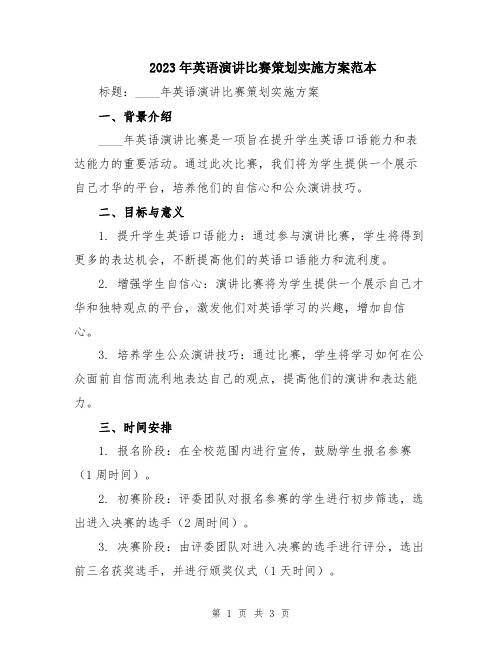
2023年英语演讲比赛策划实施方案范本标题:____年英语演讲比赛策划实施方案一、背景介绍____年英语演讲比赛是一项旨在提升学生英语口语能力和表达能力的重要活动。
通过此次比赛,我们将为学生提供一个展示自己才华的平台,培养他们的自信心和公众演讲技巧。
二、目标与意义1. 提升学生英语口语能力:通过参与演讲比赛,学生将得到更多的表达机会,不断提高他们的英语口语能力和流利度。
2. 增强学生自信心:演讲比赛将为学生提供一个展示自己才华和独特观点的平台,激发他们对英语学习的兴趣,增加自信心。
3. 培养学生公众演讲技巧:通过比赛,学生将学习如何在公众面前自信而流利地表达自己的观点,提高他们的演讲和表达能力。
三、时间安排1. 报名阶段:在全校范围内进行宣传,鼓励学生报名参赛(1周时间)。
2. 初赛阶段:评委团队对报名参赛的学生进行初步筛选,选出进入决赛的选手(2周时间)。
3. 决赛阶段:由评委团队对进入决赛的选手进行评分,选出前三名获奖选手,并进行颁奖仪式(1天时间)。
四、参赛要求1. 学生年级:全校范围内全日制在校学生均可参赛。
2. 演讲主题:自由选择,要求与英语学习或个人成长相关。
3. 时间限制:初赛每位选手3分钟,决赛每位选手5分钟。
4. 评分标准:内容表达清晰、逻辑连贯、语言流利、语法正确、表达自信等。
五、评委招募及培训1. 评委招募:由学校英语教师和具备英语语言能力的专家担任评委。
向教师和外籍教师发送招募公告,并进行面试选拔。
2. 培训准备:选拔出的评委将参加一次培训会议,了解比赛的目标、评分标准和评审流程。
六、宣传推广1. 海报制作:制作演讲比赛的海报,张贴在学校各个主要区域,引起学生的关注。
2. 班级宣传:班级辅导员和英语教师宣传演讲比赛,并鼓励学生积极参与。
3. 社交媒体推广:通过学校官方微信公众号和其他社交媒体平台宣传比赛详情、报名方式和比赛进展情况。
4. 口头宣传:在学生会例会、班级会议和英语课上进行口头宣传,提醒学生们积极参与。
外研社杯英语演讲比赛选拔策划书
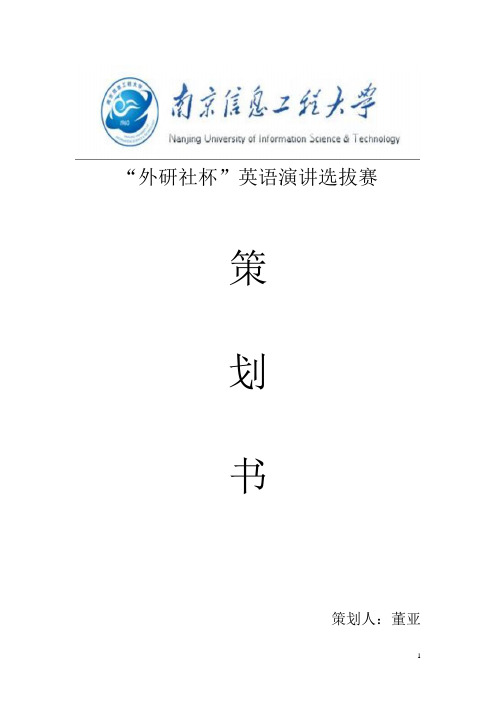
“外研社杯”英语演讲选拔赛策划书策划人:董亚一、活动背景:经教育部有关部门批准,外语教学与研究出版社主办、教育部高等学校大学外语教学指导委员会合办的全国性英语演讲赛事“外研社杯”全国英语演讲比赛(原CCTV杯全国英语演讲比赛)即将进行,大会旨在为大学生创造一个激励英语学习,培养思辨能、展现综合风采、培养优秀人才的平台,同时为中西文化架起一座促进文化沟通、增进国际交流的渠道。
为了提高大学生英语综合素质,迎合此项活动,我院决定组织在校学生参加“外研社杯”英语演讲比赛的选拔。
二、活动目的:①激发大学生学习英语的兴趣和热情,营造校园英语学习的浓厚氛围。
②激励大学生勤奋学习,学以致用,提高学生们英语口语技能。
③增强创新意识和实践能力,促进同学们全面发展。
④迎接即将来临的全国“外研社杯”英语演讲比赛,在我院选出优秀的选手参加校级选拔,从而参加江苏省的选拔。
最终参加全国的“外研社杯”比赛。
三、活动主题:待定四、活动时间:五、活动地点:六、主办单位:信息与控制学院学生会学习部七、活动对象:信息与控制学院全体学生(请09、10的同学踊跃报名)八、活动内容:每位选手自由确定题目,但必须围绕主题演讲,且每个人的演讲既不能太短也部能太长,大概保持在5分钟左右。
总活动时间在1-2个小时,活动当天安排部内分工协作,共同完成选手的选拔工作。
九、奖项设置:一等奖 1人二等奖 2人三等奖 3人优秀奖若干十、活动前宣传及报名方案:1、由院学生会学习部将比赛通知下发到各班学委,并鼓励同学积极参加报名。
并在赛前做好报名的统计任务。
2、委托院学生会宣传部提前出好宣传版,并放置在教学楼或是学校新街口对活动进行宣传。
3、在比赛前一天对参赛选手进行抽签,确定演讲的顺序。
十一、活动当天的具体活动流程:1、提前申请教室,并于活动当天我部人员提前30分钟左右到达会场对会场进行布置,并且请宣传部的人帮忙写好黑板字。
2、邀请嘉宾和评委团进行入座,以及安排各班同学和参赛选手的就座。
英语演讲比赛培训方案
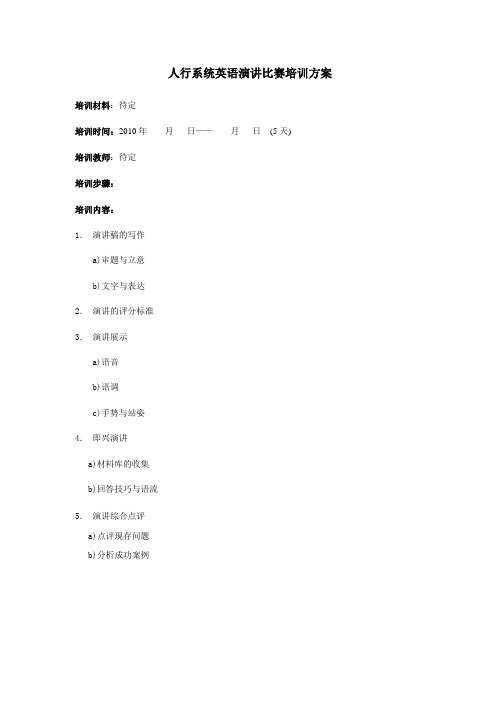
人行系统英语演讲比赛培训方案培训材料:待定培训时间:2010年月日——月日(5天)培训教师:待定培训步骤:培训内容:1.演讲稿的写作a)审题与立意b)文字与表达2.演讲的评分标准3.演讲展示a)语音b)语调c)手势与站姿4.即兴演讲a)材料库的收集b)回答技巧与语流5.演讲综合点评a)点评现存问题b)分析成功案例第一阶段:材料组织及参赛技能培训·撰写演讲稿:以选手中文稿为基础,教师完成英文演讲稿。
·设计情景剧:教师提供一篇英文材料,帮助选手疏通,并将其改编成情景剧。
·纠正语音、语调:教师指导选手大量朗读英语材料。
·培训1号选手演讲技能:教师指导其朗诵技能及演讲技能,包括语音、语调、联读、节奏、仪态及情感表达等。
·扩大选手词汇量:要求选手课下熟悉四级词汇及金融英语词汇,课堂上检查。
·提高选手听说及用英语思维的能力:1.每次每选手准备40单词,课堂上两人一组轮流表达并猜测单词;教师将选手准备的单词和教师提供的单词混合,让选手表达并猜测,以进一步提高其应变能力。
2.教师布置选手课下听、读短文,课堂上教师选择短文让一人朗读,教师就短文内容提问题,选手回答。
·提高选手表演技能:给选手讲解西方人与中国人不同的身体语言,指导其模仿,达到形似和神似,为表演情景剧打下基础。
第三阶段:模拟演练·第一次演练:邀请人行专家3-4名,组成评委组,选手按比赛章程演练。
目的是找出问题和差距,准备第二次模拟练习。
·第二次演练:力争将选手的心理调整到最佳状态,为正式参赛做好准备。
大学英语竞赛培训方案

大学英语竞赛培训方案介绍大学英语竞赛是一项旨在提高学生英语水平和综合能力的比赛活动。
本文档将提供一份大学英语竞赛培训方案,帮助参赛学生有效地准备和参加竞赛。
培训目标•提高英语听、说、读、写的能力•增强学生英语综合应用能力•培养学生的英语思维和表达能力•锻炼学生的应试技巧和策略培训内容听力训练•选择有针对性的英语听力资料,包括听力课程、视频和录音等,以提高学生的听力理解能力。
•练习英语听力理解技巧,如预测信息、注意关键词和上下文推理等。
•引导学生多参与听力实践活动,如听写、听力填空和听力问答等。
口语训练•组织学生进行英语口语练习,如对话、演讲和辩论等。
•培养学生的口语表达能力和自信心,提高口语流利度和准确性。
•给学生提供各类口语话题和范文,指导学生的口语表达和思维能力。
阅读训练•选择有足够难度的英语阅读材料,如英文报刊、杂志和学术论文等,以提高学生的阅读能力。
•指导学生如何快速有效地阅读,如扫读、略读和细读等技巧。
•练习阅读理解技巧,如找关键词、推断作者意图和筛选答案等。
写作训练•引导学生进行各类写作训练,如作文、翻译和写作练习等。
•提供写作模板和范文,帮助学生提高写作技巧和语言表达能力。
•鼓励学生多进行写作实践,如写日记、写读后感和写信等。
综合能力训练•定期组织模拟竞赛活动,以检验学生的英语综合能力。
•给学生提供真实竞赛题型和答题技巧,帮助他们熟悉竞赛环境和要求。
•分析学生的竞赛表现,并给予个性化指导和反馈。
培训方法•灵活运用教师讲授、自主学习和小组讨论等多种教学方法。
•结合互联网和多媒体技术,提供在线学习资源和互动学习环节。
•鼓励学生参加英语角、辩论赛和英语演讲比赛等英语实践活动。
培训时间安排大学英语竞赛培训通常为期10周,每周安排2-3次培训课程,每次课程持续2小时。
具体培训时间安排如下:培训阶段培训内容培训课时时间安排第一阶段听力训练10课时每周2次,每次1小时第二阶段阅读和写作训练10课时每周2次,每次1小时第三阶段口语训练10课时每周2次,每次1小时第四阶段综合能力综合训练和模拟竞赛10课时每周2次,每次1小时培训评估为了及时了解学生的学习进展和培训效果,应定期进行培训评估。
英语口语大赛(专业组)培训计划

时间
内容
地点
3月12日
3月13日
本校学生口语大赛的初赛及复赛
324
3月16日
比赛流程及仪态仪表培训
321
3月21日
图表描述技巧培训
321
4月3日
常用英语口语总结与练习
321
4月9日
英语图画及广告的描述技巧
321
4月13日
英语语音训练;即兴演讲训练Topic: How to present courage
2012年福建省职业院校技能大赛
“实用英语口语(专业组)”参赛选手培训计划
1、实施方案:本次实用英语口语(非专业组)的培训由游秀英老师担任。主要分为三个阶段培训:1、选出适合的选手对其进行语音语调的培训;2、针对参赛项目进行逐项培训;3、模拟比赛现场进行培训。
2、所需课时:每次两课时,2*8=16课时
321
4月18日
英语语调训练;即兴演讲训练Topic: Globalization
321
4月20日
ቤተ መጻሕፍቲ ባይዱ模拟比赛项目培训
321
演讲培训活动方案(二篇)

演讲培训活动方案为了丰富学校文化内容和广大同学的课余生活,加强英语的学习和交流,提高同学们学习英语的积极性,给广大学生提供一个展现自我,提升自我的机会和舞台,英语组决定举行此次英语演讲比赛。
一、活动主题英语演讲比赛二、活动目的〈1〉提高同学学习英语的积极性,特别是提高对英语口语训练的积极性。
〈2〉丰富学生的课余生活。
〈3〉为学生提供一个学习和交流英语学习的平台,共同进步。
〈4〉加深对英语口语的重要性的认识。
〈5〉通过举办活动,为广大英语爱好者提供一个互相交流和学习的机会。
三、活动前准备工作1、活动时间及场地安排报名时间:__月_日——__月_日预赛时间:__月_日晚上__点_分开始预赛地点:办公楼一楼北阶梯教室决赛时间:__月_日上午_点决赛地点:办公楼二楼大阶梯教室组织者:__2、主持人的选定比赛选男女主持人各一名。
3、评委和嘉宾的邀请评委:备课组长(__),备课组长(__)__团委书记兼评委。
嘉宾:__校长,__副校长,__副校长,__副校长,__团委书记,__级部主任,__级部主任,蔡高钦级部主任。
4、对参赛选手的要求【1】参赛对象:全体学生。
【2】参赛人数:初赛每班三人,多者班级由任课教师评选_人。
每个级部先初赛选出_人,参加决赛。
【3】选手自选题目。
要求演讲内容积极、健康、向上。
【4】举止大方,表现自然,与观众有目光交流。
有适当的肢体语言,有才艺展示。
【5】如有背景音乐,则自带。
【6】自备服装和道具(如有需要)。
四、演讲比赛1、比赛规则【1】比赛以公平公正为原则,以丰富和活跃校园生活、促进交流与沟通为宗旨,分为预赛和决赛二个阶段,预赛在级部内部进行,由各级部自行组织实施,选出_名选手参与决赛。
决赛在整个高二级部内部进行。
【2】大赛分为自我介绍,演讲比赛,才艺展示三个环节。
依据评委打分计算出成绩,最后颁发一等奖、二等奖、三等奖和参与奖。
2、活动流程【1】主持人开场白。
【2】领导讲话致辞苏本轼校长讲话。
- 1、下载文档前请自行甄别文档内容的完整性,平台不提供额外的编辑、内容补充、找答案等附加服务。
- 2、"仅部分预览"的文档,不可在线预览部分如存在完整性等问题,可反馈申请退款(可完整预览的文档不适用该条件!)。
- 3、如文档侵犯您的权益,请联系客服反馈,我们会尽快为您处理(人工客服工作时间:9:00-18:30)。
英语演讲比赛选手选拔培训计划
为了配合本学期教务科提出的培训英语演讲选手的要求,结合我校学生英语实际水平,现计划做好以下工作:
一、培训项目:英语演讲
二、培训对象:10春幼师班冯润芳、10秋服装班吴海丽,其余的待选拔
三、培训时间:从第五周开始,逢周一、二、四的第七节课
四、培训地点:教学楼一楼多媒体教室
五、培训目标:锻炼最大胆的发言,锻炼最大声的说话,锻炼最流畅的演讲。
六、培训内容:
(自我激励誓言:我一定要最大胆地发言,我一定要最大声地说话,我一定要最流畅地演讲。
)
一)、积极心态训练
1、自我暗示:每天清晨默念10遍“我一定要最大胆地发言,我一定要最大声地说话,我一定要最流畅地演讲。
我一定行!今天一定是幸福快乐的一天!”(平常也自我暗示,默念或写出来,至少10遍。
)
2、想象训练:至少5分钟想象自己在公众场合成功的演讲,想象自己成功。
3、至少5分钟在镜前学习微笑,展示自己的手势及形态。
二)、口才锻炼
A、每天至少10分钟深呼吸训练。
B、抓住一切机会讲话,锻炼口才。
1、每天至少与5个人有意识地交流思想。
2、每天大声朗诵或大声讲至少5分钟。
3、每天训练自己“三分钟演讲”一次或“三分钟默讲”一次。
4、每天给亲人、同学至少讲一个故事或完整叙述一件事情。
5、注意讲话时的一些技巧。
a、讲话前,深吸一口气,平静心情,面带微笑,眼神交流一遍后,开始讲话。
b、勇敢地讲出第一句话,声音大一点,速度慢一点,说短句,语句中间不打岔。
c、当发现紧张卡壳时,停下来有意识地深吸口气,然后随着吐气讲出来。
d、如果表现不好,自我安慰:“刚才怎么又紧张了?没关系,继续平稳地讲”;同时,用感觉和行动上的自信战胜恐惧。
e、紧张时,可以做放松练习,深呼吸,或尽力握紧拳头,又迅速放松,连续10次。
C、英语演讲名人名篇节选(背诵)
三)、辅助锻炼
A、每天至少20分钟阅读励志书籍或口才书籍,培养自己积极心态,学习一些技巧。
B、每天放声大笑10次,乐观面对生活,放松情绪。
C、训练接受他人的视线、目光,培养自信和观察能力。
D、培养微笑的习惯,要笑得灿烂、笑得真诚,锻炼亲和力。
E、学会检讨,每天总结得与失,写心得体会。
每周要全面总结成效及不足,并确定下周的目标。
四)、写作能力训练
A、英语高考作文能力训练
B、英语作文常用句型及短语。
